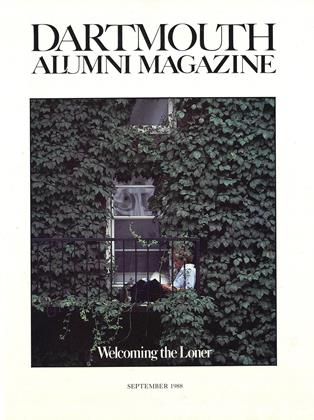The area offers the best services north of Boston.
Although the Upper Valley encompasses just 30,000 people, residents have access to urban-scale medical services. The reason is the Dartmouth-Hitchcock Medical Center, a health-care complex that includes a clinic, hospital and medical school. The Center has made Hanover a medical mecca for northern New England. Last year Mary Hitchcock Hospital alone admitted more than 15,000 patients.
In addition to treating patients, Dartmouth-Hitchcock has a major research component. In 1987, scientists received 200 grants worth more than $22 million and announced breakthroughs in the use of hyperthermia for cancer patients and in bone-marrow transplants to treat leukemia.
The Medical Center is embarking on an ambitious expansion. Site clearing began in May for a $200 million complex off Route 120 in Lebanon. When completed, the new center will cover 1.2 million square feet and house the hospital, Hitchcock Clinic and Dartmouth Medical School. The first phase of the project is scheduled for completion in 1991.
Health-care options are not limited to the medical center. Hanover is the hub of a network that includes a smaller community hospital, a veTeran's hospital and an array of outpatient and extended-care services. "In having the Dartmouth-Hitchcock Medical Center and all the rest, there is a quality and diversity as large as can be found outside of Boston," says Stephen Marion, vice president for planning for the Hitchcock Alliance. His group coordinates complex services provided by the DartmouthHitchcock Medical Center and the Veterans' Administration Hospital in White River Junction.
The area's smaller hospitals cater to specific markets. Veterans can take advantage of the Medical Center's expertise while staying at the 229-bed Veterans' Administration Hospital. Lebanon's Alice Peck Day Hospital, which pegs itself as an alternative to the larger Medical Center, recently opened an extended-care facility and a substance-abuse clinic.
Outside of the institutional setting, several area organizations offer skilled nursing, physical and occupational therapy, homemaker services and adult daycare programs. The region also has four nursing homes.
Plans are on the boards for a selfcontained retirement community called Kendall-at-Hanover. The community, slated to open in 1991, is designed for people over 65 who want independent living with the guarantee of a lifecare contract. According to spokesperson Peter Bien, professor of English at Dartmouth, the project is patterned after others built by the Society of Friends. To date, some 470 people have put down a deposit of $1,000 in anticipation of completion.
Work: Fritz Hier '44 finds Cornish, N.H., close enough to campus to remain active in College affairs and rural enough to allow him to grow Christmas trees.
 View Full Issue
View Full Issue
More From This Issue
-
 Cover Story
Cover StoryWelcoming the Loner
September 1988 By Victor F. Zonana '75 -
 Feature
FeatureFrom America's Lost Cohort, the Shards of Souls
September 1988 By David R. Boldt '63 -
 Feature
FeatureIn the Galactic Search for Intelligence, We May Find Ourselves
September 1988 By Jack Baird -
 Feature
FeatureIS DARTMOUTH STILL DARTMOUTH?
September 1988 By Jay Heinrichs -
 Feature
FeatureHow to Come Back
September 1988 -
 Sports
SportsFall Sports Preview
September 1988
Article
-
 Article
ArticleTHE WYMAN TAVERN AT KEENE, NEW HAMPSHIRE
March 1920 -
 Article
ArticleDARTMOUTH CLUB OF DAYTON, OHIO, ESTABLISHED
November 1921 -
 Article
Article$100,000 for Urban Studies
OCTOBER 1965 -
 Article
ArticleSeen & Heard
Mar/Apr 2001 -
 Article
Article25,000 STUDENTS EACH YEAR
DECEMBER 1929 By E. Everett Clark -
 Article
ArticleFishing for Answers
May/June 2002 By Roxanne Khamsi '02


